Star Trek is a franchise that has been around since 1966, when we first met Captain Kirk. Since then, we have had another four series and eleven films. On May 9th, the next film in the series, Star Trek Into Darkness will hit cinemas. You might be wondering why I would be dreading this – surely, as a long-time Star Trek fan, I should appreciate the franchise being exposed to a new generation of fans, right? Wrong!
While I perfectly understand that Paramount, as a major motion picture studio, wants to commercialize their product as much as possible… what I don’t understand is why they have to gut the original concept to do so. They have moved the series completely away from its original premise in order to mold it into a mainstream cash cow… with a lot of JJ Abrams lens flare.
Why Star Trek is a great franchise
For me, a great deal of Star Trek’s appeal is an element of nostalgia. I was brought up on Star Trek – mostly on The Next Generation – which is probably how I developed a fondness for Earl Grey. My parents loved it, so it was just a matter of time with me. Our household continued to love Trek through Deep Space Nine and Voyager (who wouldn’t love to watch Jeri Ryan’s breasts?!), but we never got into Enterprise (it was only on at midnight in Australia and I’d not heard great things).
The original series of Star Trek contained a lot of political messages. One of the reasons the first pilot was rejected by Paramount was that Roddenberry had cast Majel Barrett as second in command. That was far too progressive for the suits, so she was re-cast as Nurse Christine Chapel (aka the blonde with the unrequited love for Mr Spock).
Star Trek was still the first television series to feature an African American female in a position of authority (Nichelle Nicholls as Lieutenant Uhura) – a role that Whoopie Goldberg sites as a major inspiration for her as a young woman. The show was also the first to show an interracial kiss between Uhura and Kirk (a shot that they only managed to include in the episode after Shatner deliberately gaffed every take where they didn’t actually kiss – props to ol’ Bill for that one).
Star Trek: The Original Series benefitted from its ‘space’ and ‘future’ setting. It allowed the show to address topical issues such as race and religion. For instance, the episode ‘Let That Be Your Last Battlefield’ tackles the issue of race – arguing the futility of alien races fighting against each other when the colours on their faces are simply on opposite sides. The episode, ‘The Apple’, questions blind faith in religion when the Enterprise encounters a group of people who make sacrifices to a god… who turns out to be a computer.
In The Next Generation, Roddenberry’s idealized view of the future takes a step up with the introduction of the Prime Directive:
As the right of each sentient species to live in accordance with its normal cultural evolution is considered sacred, no Star Fleet personnel may interfere with the normal and healthy development of alien life and culture. Such interference includes introducing superior knowledge, strength, or technology to a world whose society is incapable of handling such advantages wisely. Star Fleet personnel may not violate this Prime Directive, even to save their lives and/or their ship, unless they are acting to right an earlier violation or an accidental contamination of said culture. This directive takes precedence over any and all other considerations, and carries with it the highest moral obligation.
On top of this, the Federation of Planets has eradicated both religion and money. I was curious as to how this worked – while I can potentially see that a government could stop the use of money (although I don’t think it would ever work), I can’t understand how we could ever ‘grow out’ of religion (as much as I would like us to).
Why JJ Abrams’ Star Trek sucked
This film was so awful that I cried in the cinema. I realize that this may immediately put me into the category of ‘crazy Trekkie’ but hear me out. Unlike every other new iteration of Star Trek, Abrams decided to go back to the characters of the beloved original series… and proceeded to bastardise them. These are characters that I love so much, that I admit it goes a little beyond simple enjoyment of them, nudging slightly over the line of obsession. But hey, it is Star Trek, he should have known that Trek fans have the potential to be very possessive of their universe.
While I admit that I did enjoy Simon Pegg as Scotty (despite not really being too faithful to Jimmy Doohan’s), I simply DO NOT understand the casting choices for the big three: Kirk (Chris Pine), Mr Spock (Zachary Quinto), and Bones McCoy (Karl Urban). Chris Pine was previously known to me from Princess Diaries 2: The Royal Engagement – not exactly a glowing recommendation for him to play one of the greatest starship captains sci fi has ever known! He is a terrible actor, and his head is too big to allow anyone else any space on camera.
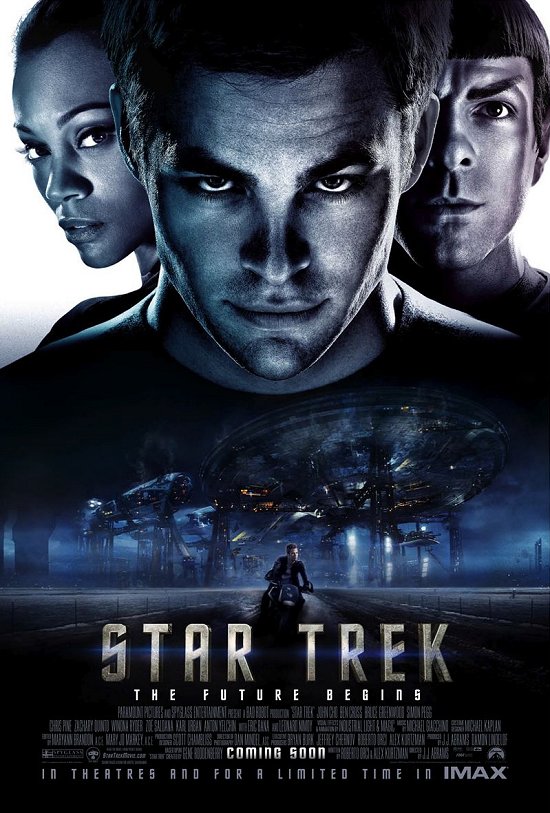 And Zachary Quinto? Heroes was an awful show, can’t we just move on and pretend no one ever bothered to get caught up in the invented hype? Mr Spock was always my favourite character. His love of logic and inability to allow emotions in made him the perfect unattainable, mysterious man. The one we all wanted but knew we coul never have. How I felt for Christine Chapel. So why was this unfeeling character suddenly doing the nasty with Uhura? When was that ever a thing?! Nooooooooooooooo! Spock is far too emotional in Abrams’ Star Trek… so emotional that he was not Spock at all.
And Zachary Quinto? Heroes was an awful show, can’t we just move on and pretend no one ever bothered to get caught up in the invented hype? Mr Spock was always my favourite character. His love of logic and inability to allow emotions in made him the perfect unattainable, mysterious man. The one we all wanted but knew we coul never have. How I felt for Christine Chapel. So why was this unfeeling character suddenly doing the nasty with Uhura? When was that ever a thing?! Nooooooooooooooo! Spock is far too emotional in Abrams’ Star Trek… so emotional that he was not Spock at all.
I quite like Karl Urban, he was a great Judge Dredd, but he was wrong as Bones. Maybe this had more to do with a terrible script and terrible dialogue, or maybe it was because he had yet to build the rapport with Kirk and Spock, but he just wasn’t right. In the original series, Bones is also significantly older than the other two; something he believes gives him the right to be an arrogant know-it-all. And we love him for it. Karl Urban seemed too much on par with the others, not someone who had years more experience under his belt.
Also, if Abrams wanted to write a story that so completely diverged from the plot of the original series and its corresponding films, why couldn’t he just come up with his own characters? ‘Rewriting’ the timeline, whether you dress it up in a parallel universe or time paradox, does nothing to ingratiate you with fans of old. How dare he destroy Vulcan! Are you kidding me? What suit at Paramount thought that was ok? And inventing your own kind of matter (red matter), what’s that about?! While some of Star Trek is outrageously silly, most of the science is based on ideas that might actually happen one day (except of course matter transport – which was only included as they had no budget for a ship-to-surface shuttle).
Star Trek Into Darkness
Read our full review of Star Trek Into Darkness here.
It is almost time for JJ Abrams to throw up all over the screen again in his latest Star Trek film. What will be in store for, I wonder? From the looks of the trailer, a whole lot of nothing. It is all action packed, with very little substance. Where’s the politics, the social commentary? Where’s the characterization? Oh, you left them behind in favour of lens flare, big guns, and special effects? Of course!
Yet again they are taking a story from the original series, telling us the story of Khan (Ricardo Montalban’s genetic superhuman). This time however, we have Benedict Cumberbatch as the baddie. While I like Cumberbatch, especially in his understated performance in Tinker, Tailor, Solder, Spy, he is all wrong for the part of Khan. I mean, look at the difference:
What I don’t understand is this: if Abrams wanted to use all the old stories from Trek, why did he rewrite history?!
If you like straightforward action films in the guise of sci-fi, you will probably love the look of the next Star Trek. Good for you. But if Gene Roddenberry could see what had become of his idealized view of the Earth’s possible future, I think he would hang his head in shame. Since he isn’t here, I’m going to do it for him. However, you know that I’m going to be there at the cinema along with every other Trekkie, hoping that maybe I’m wrong about the latest Trek.
 Pop Verse Pop Culture Universe
Pop Verse Pop Culture Universe
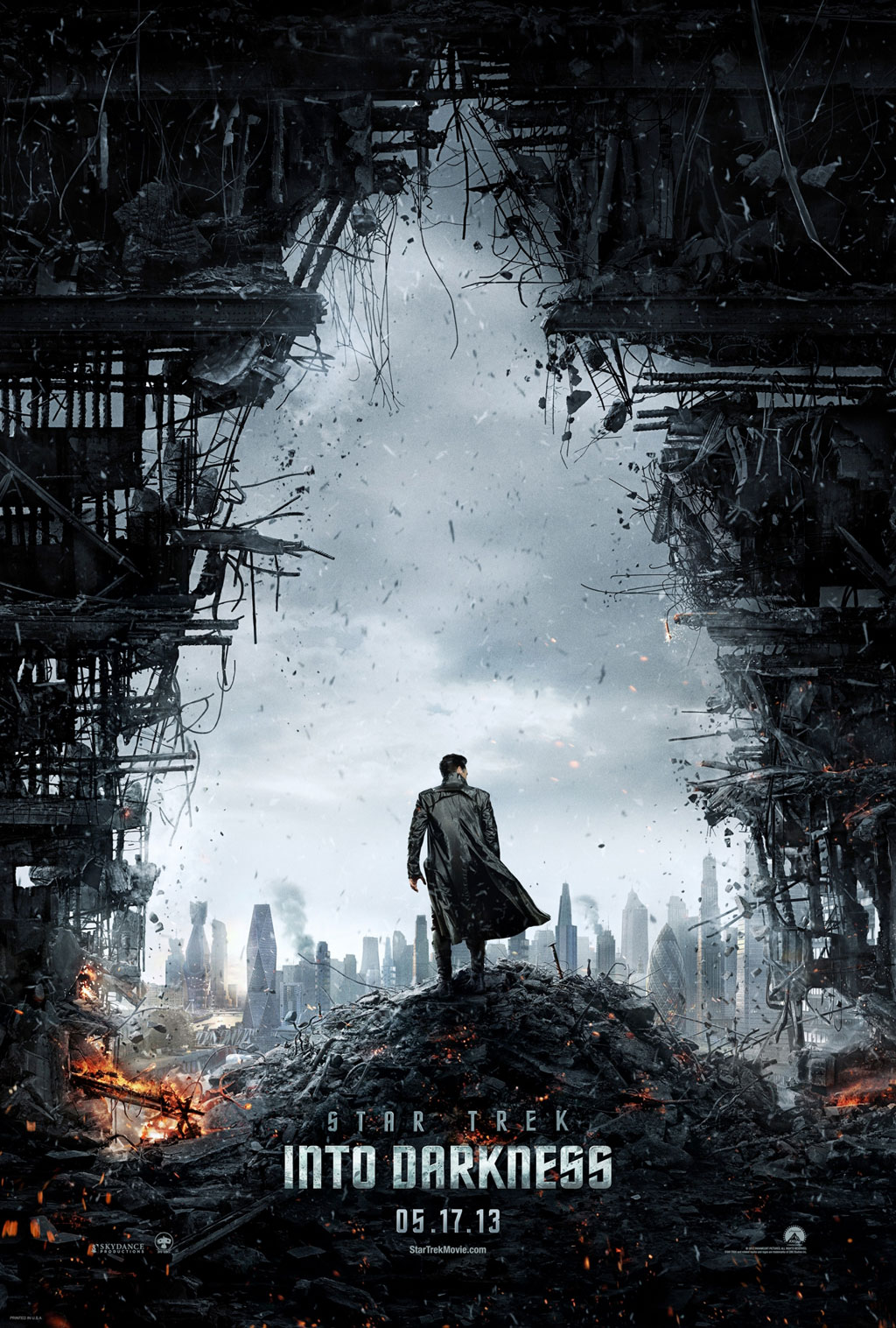
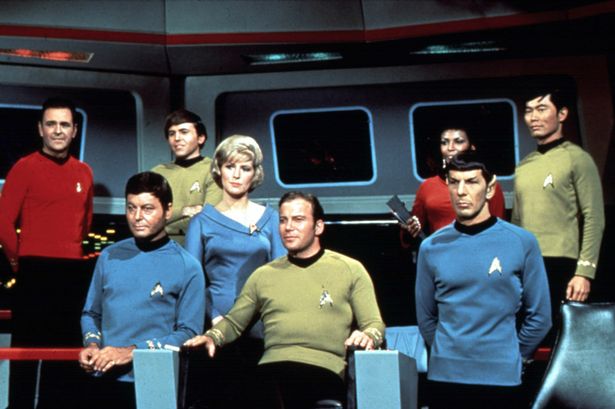
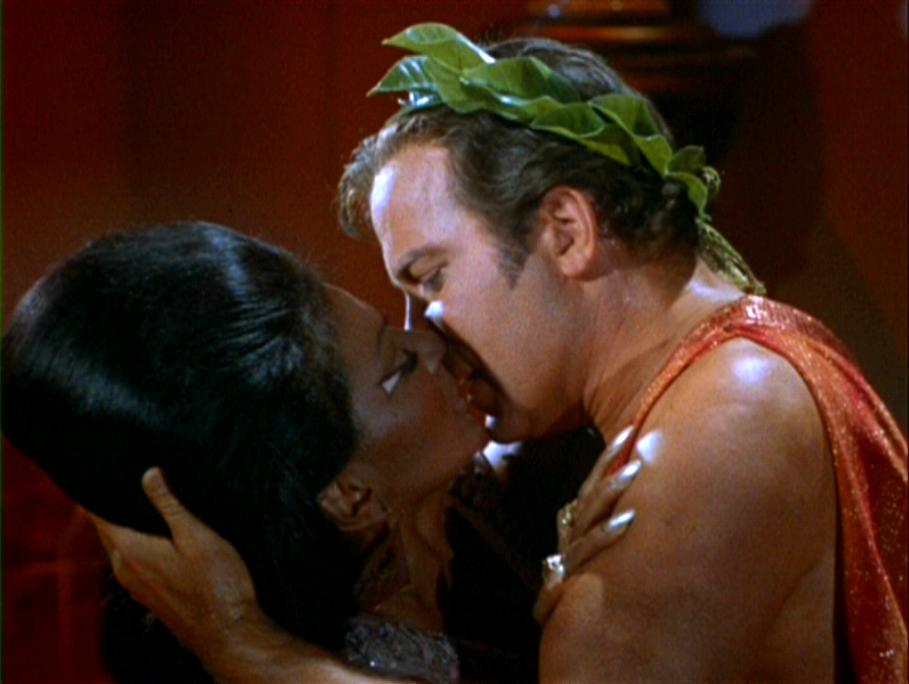
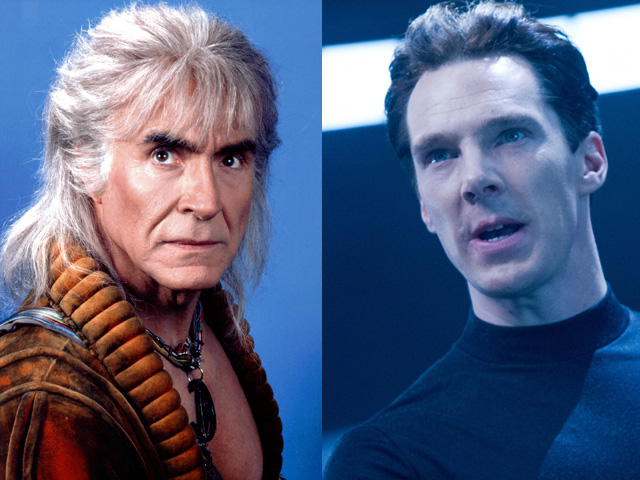
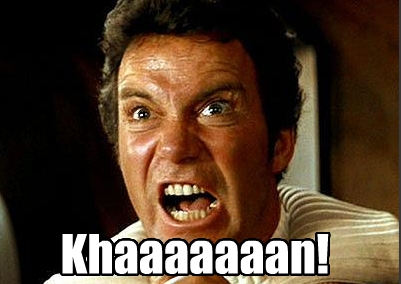

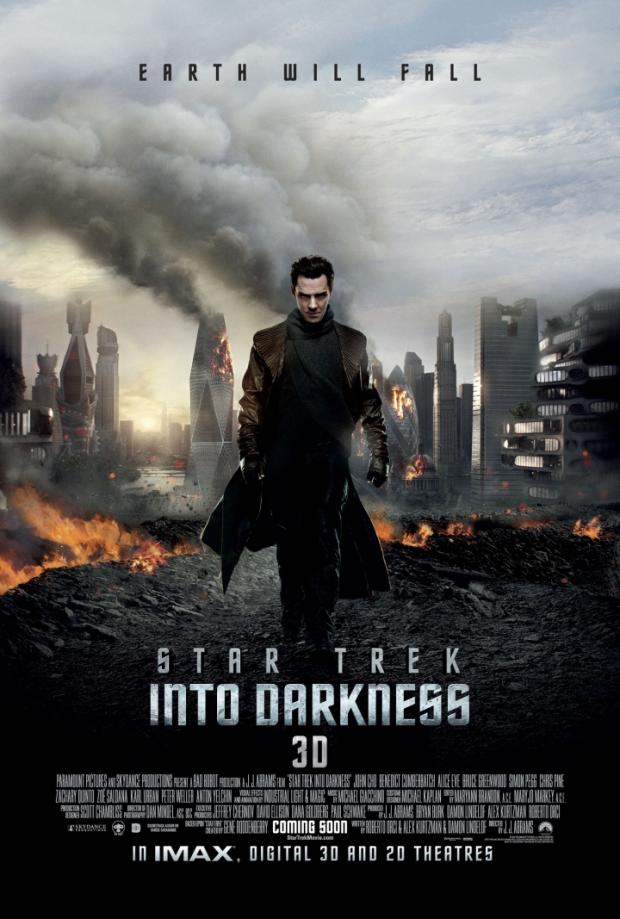
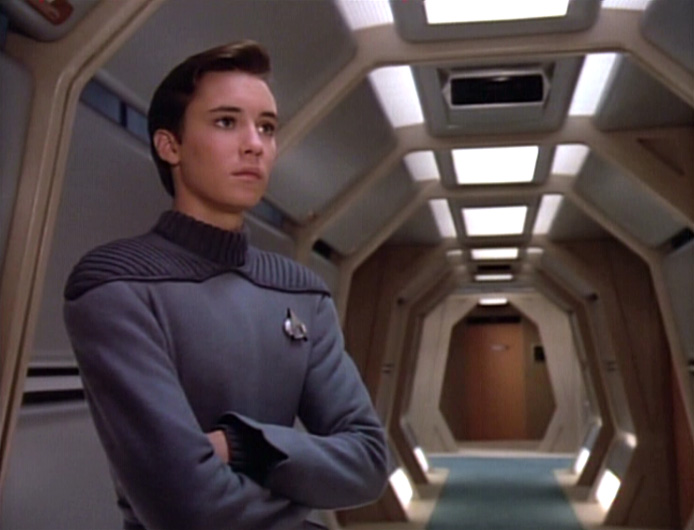



Yeah, I agree completely. I was willing to go along with the last movie, but this current movie had zero originality, zero character development, and apart from its setting, had very little to do with science. I get that the Trek movies tend to more action based than the TV shows, but even the worst of the old Trek films still had at their core a social or scientific IDEA. There is no there there. Where was the plot? It was a retread of not only an old TV episode, but of a previous movie. Abram’s Trek is hollow. I won’t be going to any more of his movies.
It’s funny that you never got into Star Trek: Enterprise. It is actually a good show. It takes a few episodes to warm up, but by mid-season…you’re hooked.
Additionally, thanks to JJ Abrams rewrite of the Star Trek Universe, the Enterprise saga is the ONLY Star Trek show left entirely untouched.
Now, I have a time-travel question for all you other Trekkies:
In the TNG movie “First Contact”, Picard goes back in time to stop the Borg before the first warp flight. In the show “Enterprise”, Archer makes contact with the Borg, who manage to send Earth’s Coordinates back to the Delta Quadrant through a subspace message. According to T’Pol, the Vulcan science officer, the message will take several hundred years to reach the Borg Collective. It is assumed that this sub-space message is the prompt that gives away Earth’s location to the Borg, which will cause them to travel back in time as seen in First Contact.
So essentially, Captain Archer’s encounter set’s the stage for the First Contact movie.
Problem: Since the timeline has been re-written by JJ Abram’s folly, who will meet the Borg in defense of Earth? There are no guarantee that Picard will ever become Captain of the Enterprise.
Shouldn’t the rewrite of history have resulted in Earth being a Borg colony, rather than simply creating a Bizarro Kirk and Spock?
Beyond awful. Deport Abrams.
First star trek
now lets let him ruin star wars also
afterwards i suppose he going to dig up my grandmother and
skullfuck her
keep him away from Dr who
He’s not to blame. It’s the tempo. Things need to be basic now… nothing like ‘Excalibur’.
Abrahms has never done anything well, and now he has ruined trek. Where did this bozo come from?
I havent heard whining n’ crying as in this article and the comments since my 5 year old couldnt get a tickle me elmo. Would you all like some cheese with that whine?
JJ Directed the movie. He didnt write, or script it you nimrods. I thought Star Trek fans were intelligent, mature people? Guess I was wrong.
A film is basically considered the director’s piece. Baby Abie was the director; it was his piece.
Yes, the director pretty much has final say over things in a film, unless completely overridden by studio execs. He could have demanded a complete rewrite if he wanted. Unfortunately, he had no clue about anything having to do with Star Trek before he went into production, didn’t like it and couldn’t understand it when he finally did watch some episodes.
J.J. Abrams did ruin the movies. He did. They were so confusing and had no plot line. And he doesn’t like Bones. He thinks he’s a waste of time. I’m sorry but I’m sure Deforest Kelley would be rolling in his grave. I agree with you on the topics but can we all take a moment and realize Karl Urban made Leonard Nimoy cry the first time he saw him play as Bones due to the fact he reminded Leonard of Deforest. I seriously believe the only good casting in this entire movie was Karl, Anton (Chekov), and Simon. Everything else I agree with. I may be 17 and gotten into Star Trek through the movies, but I grew up with some TNG and I love TOS Star Trek. It’s the best. 🙂
I grew up in the 1960s with the original series, and continued watching the the movies, TNG, and the other series as well. I can’t even to begin to say how bad Abrams sucks. As Homer Simpson would say; He is the suckiest suck that ever sucked! He destroyed everything good about Star Trek and brought every crappy aspect of movie making today and tossed it into his twisted vision of what Rodenberry originally did right in the first place. I refuse to see anything he is involved with, and that includes another trek film, because I know as soon as he finishes up on dregj’s poor grandmother’s skull, he will get right back to fucking up all the classic science fiction he can.
I have my doubts about your claims of being a star trek fan. I’m guessing you got your info online. The prime directive wasn’t introduced in next generation, it was a recurring central premise in the original series. Nice try Megan – like Abrahams you’re trying to portray yourself as something you aren’t.
Sure, it was mentioned in original series but didn’t really have any baring on the crew’s decisions. Kirk never worried about interfering with the local culture – that was pretty much his raison d’etre. It was a VERY DIFFERENT thing when it came to next gen, and its incarnation from then on is what impacted the universe and gave it its moral code.
That isn’t right at all, it was repeatedly issue in the series. In fact, the central plot in episodes like bread and circuses, patterns of force, and a piece of the action involved the crew investigating contaminated civilizations. In many other episodes the issue was mentioned.
The fact that kirk frequently violated the directive was due to the difficulty of constantly writing around such a restrictive policy (and other captains violated it in the subsequent series as well).
It certainly was a central plot in some episodes, and acknowledged in others. To claim it was “introduced” in next generation, and now to claim it had no “baring”, is simply not true.
Oh… Incidentally, another one of your errors is to proclaim religion eliminated. In fact,although rodenberry was a humsnist , we see elements of religion throughout star trek, from the deep bajoran religious beliefs to the cheesy search for god in star trek five, to captain Picard’s spiritual references in response to data’s inquiries about death ( where silence has lease). I for one am glad that trek writers have not been so simple minded as to take the rather vacuous anti-religion atheism so pervasive in society today. True explorations of religion and spirituality are heady and demanding theological and philosophical undertakings, and the thoughtful aren’t so quick to dismiss them.
Religion and spirituality are very different. Picard and the others aboard the Enterprise frequently comment on primitive cultures still having religion.
From Memory Alpha (http://en.memory-alpha.org/wiki/Human_religion)…
Gene Roddenberry himself is said to have rejected the idea of religion lasting into Humanity’s future. Ronald D. Moore commented regarding the fate of specific religions in Trek history: “Gene felt very strongly that all of our contemporary Earth religions would be gone by the 23rd century, and while few of us around here actually share that opinion, we feel that we should leave this part of the Trek universe alone.” (AOL chat, 1997) “It was a core tenet of Gene’s Trek.” (AOL chat, 1997)
Brannon Braga said that “In Gene Roddenberry’s imagining of the future […] religion is completely gone. Not a single human being on Earth believes in any of the nonsense that has plagued our civilization for thousands of years. This was an important part of Roddenberry’s mythology. He, himself, was a secular humanist and made it well-known to writers of Star Trek and Star Trek: The Next Generation that religion and superstition and mystical thinking were not to be part of his universe. On Roddenberry’s future Earth, everyone is an atheist. And that world is the better for it.”
Again, the arbitrary semantic seperation between “religion” and “spirituality” is not what I would claim to be rigorous treatment of the subject. Indeed, depending on what your personal definition of the two is, I posit that the two are largely intractable at their heart. It is always stunning to me that in piop culture today,people (who have given no real thought to the philosophical implications will claim to be “spiritual” but not “religious”, the claim I’d laughable on several levels. I am not saying that is you, but it is certainly common,
There are many, many, many. Issues that need to be addressed/debunked if we were to seriously discuss this, but let me tease by suggesting that ” morality” itself cannot exist in any meaningful way without spirituality (often disguised as some form of ” humanism “), and that, in turn is simply a less specific, less hot-button acknowledgement of religion. Let me further suggest that every person I know (save perhaps the psychopath… Something my old academic department was a world leader in researching), act, at least, implicitly (often bwhile denying explicitly) following a form of religion – something even some of the most outspoken like Dawkins (and sadly the most outspoken are often the least throughtful and rational – again like Dawkins ) are hypocritically guilty of.
In any case, I apologize for the bubble- gum treatment of a complex topic. But the limitation of blog commentary and a tablet make this medium less than conducive to a proper treatment.
“tease by suggesting that ” morality” itself cannot exist in any meaningful way without spirituality”
And yet science has found distinct morality basis in the function of the RTPJ of the brain and the functionality of the hormone oxytocin. Genetics and physiology are a basis for morality in most humans (psychopaths are wired differently) and your arguments stem from your own beliefs not based on research.
Guess those “vacuous” atheists that dominate the sciences will have to carry on despite your condemnations. I seriously doubt your claims to being involved in any department of psychology with your gaps in current research.
Neither semantic or arbitrary , the distinguishing between religion and spirituality. One being an organized movement/order of a set dogma or creed i.e. a system. The other being well pretty much whatever the fuck people want it to be.
Also, you cannot seriously be casually dropping into a star trek argument that morality can only be derived from some sort of faith/religion/spirituality/other codswallop [delete as appropriate].
While you’re insulting the intellect of the collective, archetypal Trekkie, let me ask you, sir, if you even know what a director is. The director is the guiding visionary for the movie. Whatever parts the different persons played in producing the final form of the movie, the director has final say on E-V-E-R-Y-T-H-I-N-G that makes the movie what it is. Art direction–everyone scrambles to match the director’s vision. Script polishing? That doesn’t happen unless it meets the directors vision, and the director doesn’t just roll along with whatever the studio meatheads want… directors with integrity step down before doing that. Maybe I shouldn’t assume JJ has integrity, but the fact remains that he is not simply a figurehead. No, he’s the fountainhead. (And that’s not simply a reference to Ayn Rand, which you know if you’ve studied mythology) Before wading into deeper waters with those who’ve studied film and literature and have degrees on the subject matter being discussed, you may want to prepare yourself by at least having a basic understanding of what it is you’re arguing about and some basic facts about movie production and the impact that a director has on one of his/her films. Why do you think that some movies that are really good have the director’s name attached directly to it? Why do you think they bother to make a director’s cut for movies where the director’s vision wasn’t perfectly met in final release? Just admit it: you liked the movies and don’t like being made to feel stupid for enjoying them.
Send Abrahms to N.Korea
I agree
I liked Star Trek before JJ Abrams. Saw most of them in theatres, and liked them all, until Abrams. It was a reboot. Not a sequel.
I agree.I grew up with tos as reruns.JJ. has done some great work but I think he butchard STAR TREK calling Klingon Battlecruisers warbirds for one.More action in it is good but he just beat the living shit out of Kirk & Star Trek is not Star Wars.I don’t think I need to see any more Star Trek from JJ.
I also have to agree with the overall idea of this article. J.J. Abrams doesn’t have the creativity to build a memorable film. Every film he has done has either been directly ridiculed or just forgotten because it was just another mediocre film.
Star Wars and Star Trek need someone exceptional to write, direct and produce the films.
‘Star Trek: How JJ Abrams ruined everything’ I agree with everything you have stated here! I have watched trek from the 1960’s. I am all about change, but, the essence of Star Trek was lost; Its five-year mission: to explore strange new worlds, to seek out new life and new civilizations, to boldly go where no man has gone before. If Star Trek continues this trend JJ Abrams as set, I will be one less fan patronizing the franchise…
has he ever done anything good?
just out of interest
i know alias was an embarrassing kids show
lost was an over hyped mess
his films are on a par with Spielberg for overhyped blandness
and fringe had an awful lot of laughable “science” moments
and a genius that had apparently mastered every branch of every science on the planet ,
like a Saturday morning cartoon show scientist
(and that last season)
but the last thing i can think of that i liked of his was
regarding henry in 1991
any other gems from before he started
sucking corporate cock
Why didn’t he make it happen in a different universe(not an altered timeline) so it will not effect the original universe and we Trekkies can rest peacefully.
Amen brother. Well said. It’s awful how some suits at Hollywood destroyed Gene’s vision, and allowed this talent-less director to enrage all the fans who have seen the series and the movies and had such love for the show and its universe.
Bless you.
JJ Abrams is a name brand director just like many actors. There are so many talentless actors and directors whose name brand is more important than their actual skill. Their looks and names draw crowds regardless of their actual skills. Speaks volumes of our society when we prefer a pretty face or name over a good actor in a role. Seriously, good character actors tend to be relocated to supporting roles. Take for instance Jupiter Rising. The leads were horrible while supporting characters stole the show. Abrams is a hack. Lost was an overextended version of Jacobs Ladder. Star Trek had its heart ripped out and Star Wars was a blatant plagiarism of “New Hope”. But the Abrams name sells tickets and that’s all that matters to production companies. We have been socialized to look for name brand in everything, so in the end Abrams is a product of our society.